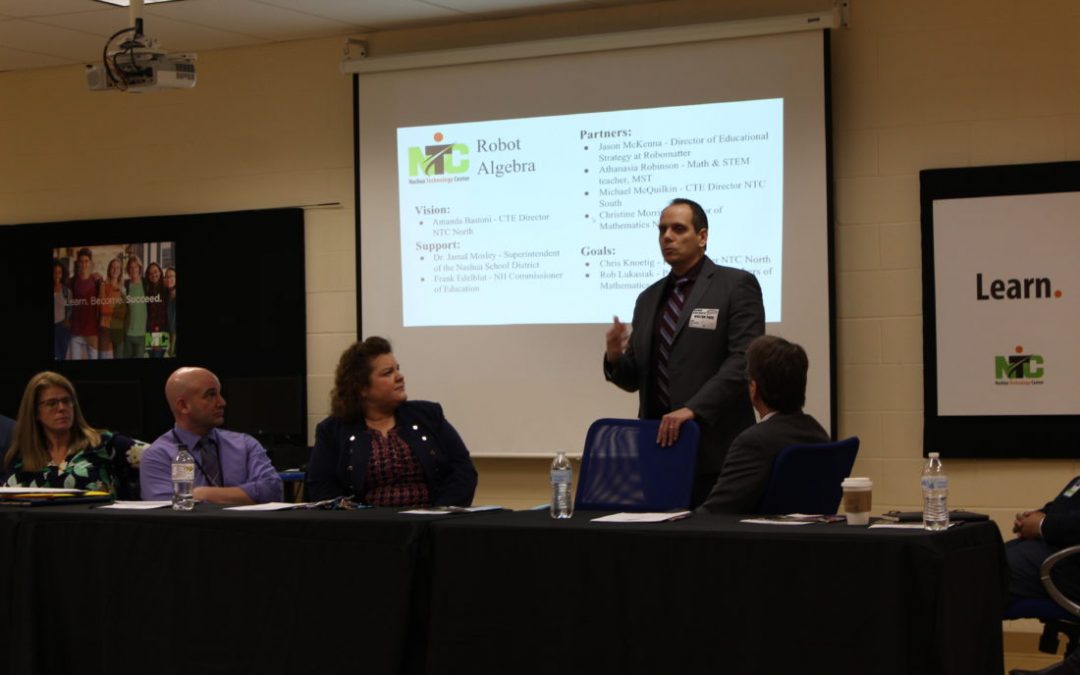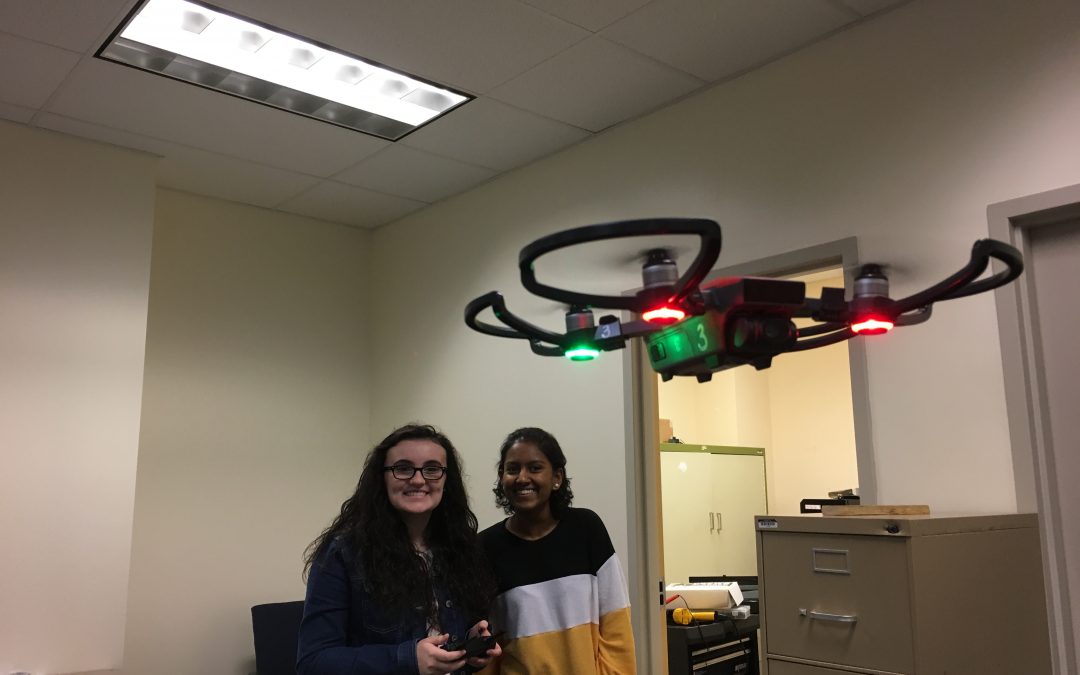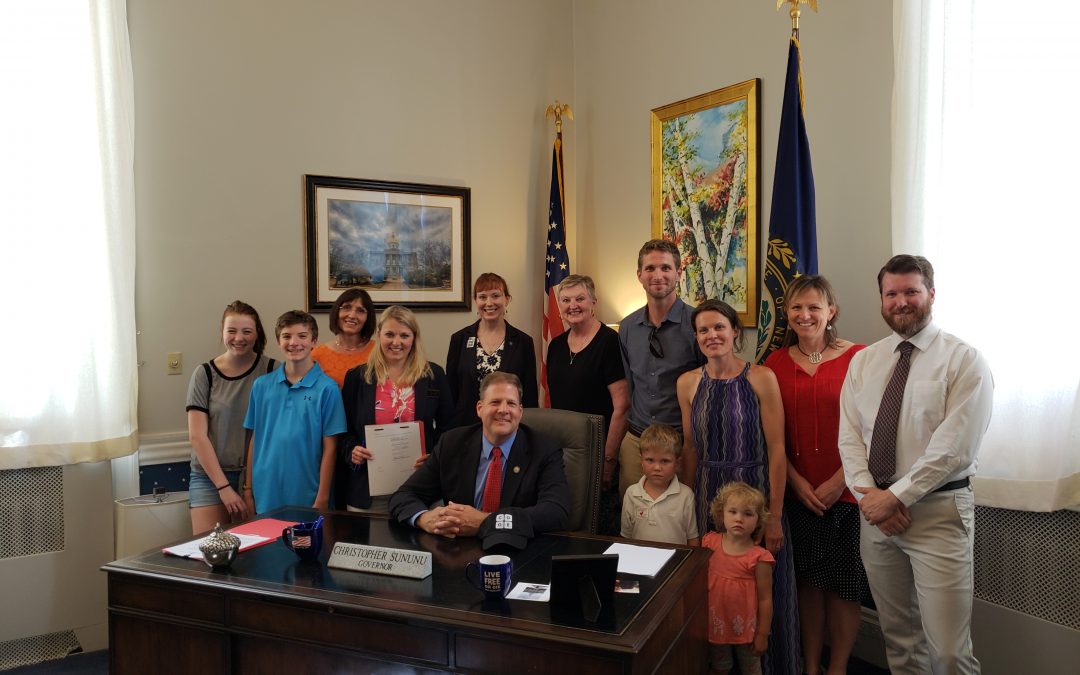
Jan 21, 2019 | Article
The state Department of Education in September awarded the Nashua Technology Center a $50,000 grant to pilot a Career Technical Education-based Algebra I course for the 2019-20 academic term, with the help of various representatives through research and feasibility testing.
For Edelblut, awarding the grant was an easy decision: he was eager, he said, to find people as interested as he is in creating a hands-on approach for students to learn math. full article

Jan 16, 2019 | Article
“Flexing” time in school
The introduction of technology is not the only change in today’s classroom, as many students struggle with availability of time, which is an issue that resulted in the Flexible Time Model (FTM).
FTM is a school structure that provides a set amount of time each school day during which students have control over where they go and what they do. The amount of time can vary, but typically ranges from 30 to 60 minutes.
The idea for the model began in 2010 when Brian Pickering, former Principal at ConVal Regional High School, found himself unable to provide additional academic help for a student involved in numerous after school activities. The student was at a loss for how to get the help she needed because her teacher could not come before school, the student could not meet after school, and they did not have a shared lunch.
“She wasn’t alone,” said Pickering. “Students at ConVal were having trouble finding time for enrichment activities, extensions, mentoring, RTI, and social emotional supports.
Looking for a solution, Pickering employed a team of teachers, staff, and students to brainstorm. What they came up with would face some stumbling blocks, and go through a few iterations, but ultimately became what is recognized today as the flexible block, which is now used across the state.
How does FTM work?
During “flexible time,” attendance is taken, and students are required to actively work, although Amanda Bastoni, Director, Nashua Technology Center North, said students “have choices over what they work on and where they work.”
“This autonomy gives students control and choice,” she said. “For example, students who are doing well in school can choose to participate in enrichment activities, others can choose to get extra help, and students who need social or emotional assistance can choose to participate in counseling.”
At ConVal, which is a typical example of FTM across the state, 43 minutes is set aside for “flexible time.” Each Monday, a homeroom mentor works with a set cohort of students to schedule where they would like to work for the upcoming week.This mentor will work with these students for four years.
“Students can also adjust their schedules as needed during the week, but having a weekly meeting allows the teacher to monitor grades and advise students,” said Pickering. “Teachers still have a scheduled prep-time and they are not expected to create lesson plans for the flexible block.”
As a teacher at ConVal before going to Nashua Technology Center North, Bastoni said she used flex time to develop relationships with students and scaffold learning by offering them opportunities to explore creative “deep dive projects.”
“I also used the time to re-teach concepts, give missed assessments, and run both Yearbook and Newspaper clubs,” she said. “At ConVal, the newspaper club was run in conjunction with the editor of the local paper who would not have been able to participate if the club had been run after school. Because it was run during the Flex Time in the school day, he could participate.”
At Nashua High School, Bastoni said she has continued to work creatively with flex time, as she wrote a successful grant that allows the center to pilot a “Girls in STEAM” course.
“It is designed to introduce girls to STEAM and drones and will transition next year into the first Drone Course taught during the school day at any high school in New Hampshire,” she said. “Students in this course and the clubs I ran at ConVal all had the opportunity to participate in the activities as ELO’s, too, which meant they could earn credit during this time.”
Aside from the flexibility it provides both teachers and students, FTM reflects best practices when it comes to learning.
“It gives students choice,” said Bastoni, and research tells us that students do better when they have control over their lives, how they spend their time, and what they work on. The current school model has no room for choice…Choice is positively associated with better performance on tests, more engaged students, more creative solutions, and less disciplinary activities.”
To learn more about the FTM, Bastoni will present at the 2019 Personalized Learning Summit. Click HERE to learn more.
This is the first of a two-part series on the Flex Time Model (FTM) where we look at its beginning in NH and rationale behind it before discussing broader implications in part two.

Dec 7, 2018 | Challenges and Opportunities, Industry
One of the biggest challenges in industry today in New Hampshire is the workforce labor shortage, a reality that serves as backdrop to a new construction career exploration program at Parkside Middle School in Manchester.
According to Jennifer Landon of Associated Builders and Contractors of New Hampshire/Vermont (ABC NH/VT), the program is unique in that it provides an educational curriculum with significant input from industry.
“Our role was to bring industry partners to the table to not only discuss what they wanted to see taught, but to be involved in the classroom and supplement the learning experience,” she said. “We’ve also reached out to suppliers to help supplement initial materials costs.”
She said ABC’s involvement stems from a call they received last year from Procon’s Jimmy Lehoux, who at the time was pushing for election to the Manchester Board of School Committee. His message during his election campaign, which he won, included a desire to bring the trades back into the schools.
“Since the 90s, trades have been slowly disappearing from our schools, and now the industry is paying the price,” he said.
This price, he noted, is an industry struggling to find workers.
“Today’s average age of a trades person is around age 53, which means that in 10 years there will be a major gap in skilled labor,” he said. “We need to help students identify the opportunities that exist in this field and also recognize that they can have an extremely successful career.”
In helping build the program with educators at the school, district officials, industry partners, ABC and others, Lehoux said they are taking a very necessary first step to addressing this need in the construction industry. As for how it works, he said the program takes the traditional wood-shop class and breaks it into mini-segments on the trades.
“Every two to three weeks the trades change to give the students an overview of different disciplines in construction,” he explained. “After each segment, an industry professional comes in and speaks with the students on subject matter, such as architecture, safety, framing, drywall, electrical, plumbing, HVAC and masonry.”
Landon said the program is also flexible enough to welcome industry partners in related sectors.
“We can expose them to many different career fields in the industry and how everything works together,” she said. “We need to build a pipeline into CTE, so having industry partners is what makes this program so unique and important. We need industry partners talking about their trades, their career paths, and the quality of life this industry offers to engage younger students. We need to expand the IBuildNH brand.”
According to Lehoux, the program is also important in that it dispels pervasive myths about construction careers, which he said many people mistakenly think are meant for those not interested in college.
“Technology has taken the lead in how we construct commercial buildings as well as residential homes,” he said.
While currently at Parkside Middle School, the program may serve as a template that could be replicated at the other three middle schools in Manchester in 2019.
“They all want in,” said Landon, who noted they are to all meet as a group in mid-December to discuss replicating the program.
The strength of this program, she said, is not just its content.
“This type of program, regardless of content, allows students to make better informed decisions about their career options,” she said. “There are several challenges we face in career planning. How do we shift the paradigm with the adult influencers? How do we embrace career exploration? What can we do to keep our youth in New Hampshire to contribute to our local economy?”
The answer is complicated, but she said industry input will continue to be essential.
“Through the Sector Partner Initiative, we are hoping programs like the one we are piloting at Parkside will help address the critical labor shortage,” she added. “The program reflects a model built around industry/education partnerships. We would like to see industry partners essentially adopt a school and have it built into their business model–everyone will benefit from such a model.”
To learn more about the construction career exploration program, or related ABC NH/VT and Sector Partner Initiative (SPI) initiatives, visit www.abcnhvt.org and https://nhsectorpartners.org/industries/construction/.

Nov 19, 2018 | Impact, Leadership
Recently, Steve Rothenberg, NHCTA/NH-CTE President, joined a diverse group of leaders from across the nation in California to discuss ways to better advance the skilled trades in the automotive, construction, manufacturing, welding and HVAC sectors.
The trip was sponsored by Harbor Freight Tools for Schools, whose guiding principle is grounded in a deep respect for the skilled trades and desire to create real opportunity for kids who love to build, fix and create. Harbor Freight Tools for Schools is a philanthropic programs of The Smidt Foundation, founded by Eric Smidt, owner of Harbor Freight Tools.
“Harbor Freight Tools for Schools brought us in to advise them on their funding priorities,” said Rothenberg.
Noting there were some “highlight influential people” in attendance, including several state commissioners of education, United Way worldwide executives, LA public transportation system architects, CTE professionals and others, Rothenberg expressed enthusiasm for their collective recommendations.
“The group felt that a pipeline for skilled trade teachers and overcoming the ‘stigma’ of the trades are the two top issues for the foundation to address moving forward,” he said. “It was a very well organized event, and I was pleased to be able to represent the interests of NH and CTE.”
In addition to receiving recommendations from the group regarding funding priorities, Harbor Freight Tools for Schools sought advice on the merits behind getting involved in policy work at the federal, state, local and/or grassroots levels.
According to Rothenberg, Harbor Freight Tools for Schools has already become deeply involved in CTE, as he noted their first foray in this arena was last year.
“They awarded $500,000 worth of prize money to ten top CTE trade teachers in 2017,” he said. “Teachers actually received $10 to $30K directly, while their programs got the rest. This year, the total was raised to $1 million…The application process has some interesting reflective elements that I think could be used for professional development.”
In reflecting on his experience at the national conference, Rothenberg said he cannot help but look ahead at other issues that could be pursued by NH-CTE. These issues, he said, cover broad areas, some of which include:
How to
- Overcome some age limits for trade-based pre-apprenticeships.
- Connect employment security, postsecondary and secondary databases to test the impact of interventions/learning, such as CTE completion.
- Establish career-related competencies for school counselors.
- Establish career credential recognition model for high school graduates.
- Create CTE teacher-leader pipelines to enhance succession planning.
- Refine and further establish ESSA career-related metrics.
- Establish statewide WBL models.
- Advocate for years of service credit for industry experience on the teacher scale for new CTE teachers.
“There is a lot for us to think about in NH and nationwide when it comes to CTE,” he added. “The conference got me thinking about an even bigger picture and the possibilities that could exist through Harbor Freight Tools for Schools.”
To learn more about Harbor Freight Tools for Schools, visit https://harborfreighttoolsforschools.org.

Nov 8, 2018 | College, Impact, Industry, Programs
With the majority of STEM jobs in computing and a projected job growth of 13% compared with 6.5% growth across all occupations, the need for computer science education has never been greater.
It is this need that in part led Creative Computing Challenge (CCC), a five-year program funded by the National Science Foundation, to establish CS4NH. A working group of business/industry, non-profits, and K-12/higher education members collaborating to bring computer science to all New Hampshire K-12 students, CS4NH is working to increase access to and participation in Computer Science educational opportunities.
CS4NH’s Terry Wolf, a NH state legislative representative and vice chair of the House Education Committee, cited “a huge shift” in the public’s understanding of the need for computer science education.
“Not too long ago, people thought Computer Science only needed to be offered at the high school level as an elective,” she explained. “Today, people want kids to be more than consumers of technology. They want them to be the creators, innovators and problem solvers.”
She said this shift in understanding, furthered by advocacy efforts by CS4NH, led to the passage of NH House Bill 1674 earlier this year, which made Computer Science as a core K-12 subject area.
“After listening to a wide variety of stakeholders, adding Computer Science to the definition of an adequate education matched what people are looking for,” she said. “The bill passed with wide bipartisan support in the legislature.”
CS4NH’s Beth Doiron, Director of College Access and DOE programs and initiatives at the community college system of NH, said skills learned in computer science courses help students build basic problem-solving skills.
“Computer science instruction helps students understand how to accomplish tasks more efficiently and help them be better prepared for college in general, regardless of their career or program major choice,” she said.
CS4NH has forged several strategic partnerships, including one with the New Hampshire Tech Alliance, which Executive Director Matt Cookson said makes sense for them in several ways.
“CS4NH goals align perfectly with the goals of our Workforce Development committee and mission of the organization,” he said. “Being able to house the efforts of CS4NH and support its growth and implementation was a logical step as we look to encourage more young people to learn about Computer Science in New Hampshire.”
Judith Burrows, Director of Student Aid at the New Hampshire Charitable Foundation, another CS4NH collaborator, said her biggest takeaway from computer science is the thought processes such a curriculum seeks to encourage.
“Computational thinking is much more than just programming or IT,” she said. “It is foundational for all businesses. It really is the currency that businesses are looking for regardless of the field.”
Citing computational thinking as “the backbone” of various forms of technology, Lori Langlois, Director, North Country Education Services, said Computer Science addresses current and future needs.
“Given the known workforce shortages in NH in computer programming, web development, and other skilled computing fields, CS4NH has an important role in advocating to increase access and participation in CS to foster these career paths for students,” she said.
Langlois said CS4NH is particularly important in her region.
“For the North Country, computer science holds the potential for developing an
innovation economy,” she said. “In order to attract new or expanding businesses, northern NH schools are focusing on computer science with the intention of making visible, the young, energetic, and talented individuals we are developing for a STEM-skilled employee pipeline.”
To learn more about CS4NH, or any related initiative, visit cs4nh.org.
This is the final story of a multi-part series on CCC and the relevance of computational thinking in the classroom and industry in NH.





